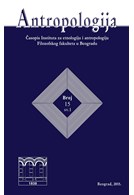KO PLAĆA CENU NEPLAĆENOG KUĆNOG RADA I KAKO SE PREMA TOM PITANJU ODNOSE EVROPSKA I DOMAĆA LEVICA?
Who pays the price of unpaid household work and what is the position of European and Serbian left on that issue?
Author(s): Marija BabovićSubject(s): Gender Studies, Marxist economics, Political Philosophy, Marxism, Culture and social structure
Published by: Институт за етнологију и антропологију
Keywords: gender inequality; unpaid work; care work; economic value; policies
Summary/Abstract: The division into "productive" and "reproductive" labor was established by a capitalist system. The mainstream economics recognizes the productive value of market labor, while unpaid domestic work and family care are defined as "reproductive," aimed at the reproduction of the family or at the aggregate level - the population. The inappropriateness of this dichotomy was emphasized by Marxist-oriented feminism and feminist economics. According to these approaches, “reproductive” labor generates economic values and can, be considered “productive”. The paper presents an assessment of the economic value of this labor. This is at the same time the value that women invest in the reproduction of the household/family, in the future labor force and society. It is a value that is appropriated by women and represents a measure of their exploitation in the private sphere, as well as in the public sphere of social reproduction of capitalism. Feminist approaches offer a variety of solutions to this social injustice, from the wage for domestic work to a model of universal care that has also the potential to transform the sphere of paid work and connect the two spheres. The left oriented political parties of the European Parliament recognize the importance of the topic, and have contributed to the adoption of the EU ‘Reconciliation Directive’. This is still far from the transformation gender relations, but it is a step forward. Among the domestic left political parties, awareness of the problem is present in the non-parliamentary Social Democratic Union, which has no influence on official policies.
Journal: Antropologija
- Issue Year: 20/2020
- Issue No: 1
- Page Range: 133-152
- Page Count: 20
- Language: Serbian

